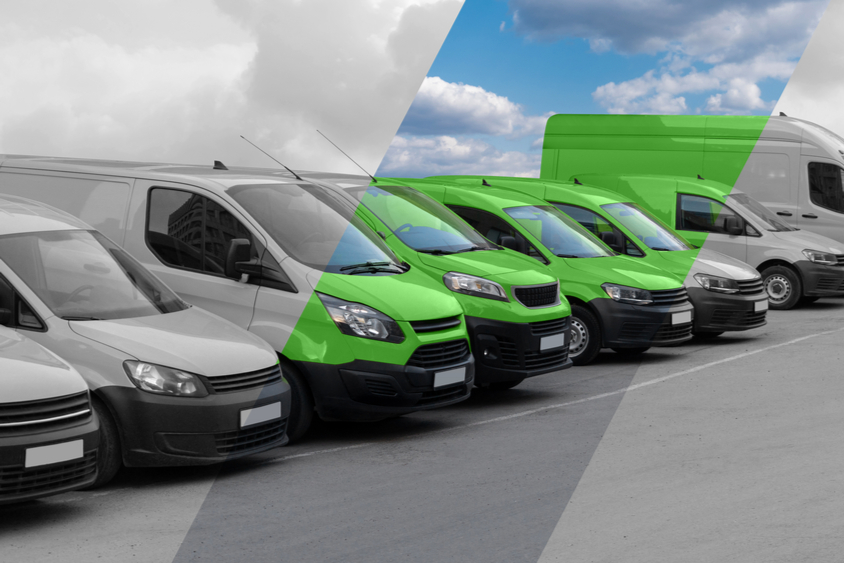With fuel costs eating up a sizeable chunk of business expenditures, we know how important it is for individuals who are self-employed, sole traders or own start-ups, to find opportunities to save money where possible. The right fuel card can help you take control of your business’ fuel costs, ultimately saving you time and money.
What is a fuel card?
A fuel card, also known as a fleet card, is a payment card used exclusively for fuel purchases and, sometimes, other vehicle-related expenses such as maintenance and repairs. These cards are typically issued by fuel companies or financial institutions and can be used at specific fuel stations or networks.
How does a company fuel card work?
First, the employer selects the type of fuel card they want for their business. After ordering the cards, they can assign each one to a driver in their fleet. Each driver can then use their fuel card whenever they fill up for work.
Employers benefit from savings across their fleet and can control company accounts with an online management tool.
The cost of fuel cards depends on factors such as fleet size and vehicle types. Some cards have an annual fee, while others are free to order. With Fuel Card Services, all information is transparent from the start, allowing you to maximise savings without hidden fees.
Types of fuel cards
Our fuel cards provide self-employed individuals with convenience and control, helping to save money, simplify administration, and streamline payment processes. Depending on your needs, you can choose to use one fuel card or opt for a combination to gain wider accessibility to fuel stations.
Fixed weekly price cards
Every litre of fuel bought on this card is charged at a fixed price throughout the week. This ensures competitive pricing, helps manage finances without fluctuations, and keeps you in control of overall fuel costs. These cards can be used at branded sites like Shell and BP or supermarket forecourts.
Pump price cards
With this card, you pay the price displayed at the pump each time you buy fuel. This type of card offers transparency and is widely accepted for petrol and diesel across the UK. For the self-employed, this type of fuel card is convenient and simple to use.
Fuel card benefits
Reducing the fuel bills is not only an option for large conglomerates or even SMEs for that matter. Sole traders can also benefit from purchasing a fuel card which could prove helpful when covering any substantial mileage.
Some of the ways in which a fuel card could prove beneficial include:
-
Save up to 5p per litre on national average pump prices
-
Save up to 10p when using our extensive motorway pump networks
-
A dedicated account manager
-
Zero liability insurance available with Card Protect
-
Interest-free credit
-
Online account management – MyFleetHub
-
MPG & CO2 emissions reporting
-
Online application
Click here to browse our range of fuel cards!
Considerations: What are the main fuel card payment tariffs?
There are two main tariff options to be aware of pump prices and fixed prices.
Pump prices
You pay the amount shown on the pump, which can fluctuate daily. Your fuel card may offer discounts at different fuel stations.
Fixed prices
These are set prices that are fixed weekly and locked in for that period, making it easier to plan your costs.
Why explore a fuel card as a sole trader?
With the industry’s widest range of commercial rate fuel cards at your fingertips, covering every major brand, we’re perfectly positioned to help you to find the right card to drive down your costs on each and every mile you drive.
Sole traders enjoy our fuel cards primarily due to the improvement they can offer to your bottom line, and the easy and flexibility with which you can enjoy these benefits. Choosing the right fuel card can prove to be a challenge, but with bespoke support available from our team, and our handy card picking tool, we’re confident that you’ll discover a fuel card that offers you attractive fuel cost savings and useful added benefits, however you operate.
Before we take a look at the specific fuel cards that sole traders tend to love, it’s key also to acknowledge how fleet services can also help improve efficiency.
Sole trader vehicle servicing support
Keep your fleet running smoothly with cost-effective vehicle servicing, maintenance, and repairs through our MyService.Expert offering. With pre-negotiated rates from thousands of garages nationwide, our pay-as-you-go service can simplify your fleet maintenance and ensure you don’t break the bank when you run into a maintenance issue during your travels.
Servicing costs are amongst the most challenging aspects of conducting business mileage as a sole trader, but let’s take it back to fuel and look at the key fuel cards you may want to consider.
The best fuel cards for self employed people, sole traders & start-ups
So, which fuel cards are the most applicable to the self-employed? Based on our existing customer base, some of the most popular fuel cards amongst sole traders include:
- Texaco Fastfuel – a popular fuel card amongst sole traders and businesses with a mixed range of vehicles. The Texaco network gives drivers great coverage across the UK, and offers a competitive fixed price on both diesel and unleaded.
- BP Plus – a great card for businesses using a mix of diesel and unleaded. BP are a well known, trusted brand and have great coverage across the UK with 70% of motorway sites. The BP Plus card gives holders access to over 3,400 filling stations, including BP, Esso, Texaco and participating Gulf sites.
- Shell One – the largest fixed price card available on the market and covers over 7,000 stations including Shell, Texaco and Morrisons. With this card, drivers can even save up to 10p per litre on diesel at Shell motorway sites.
Choosing a fuel card
Choosing the right fuel card can be an important decision to make for your business. Fuel cards make fuel management efficient and less time-consuming – allowing you to manage your expenses whilst keeping your personal and business finances separate.
There are a number of factors that need to be considered when contemplating which fuel card is right for your business needs. These include:
Location
The most appropriate fuel card will depend on the location of where you travel and which fuel stations are close by, as this will reduce the time you spend finding an alternative place to refuel.
If your business travels take you all over the UK, then a multi-network card would be well suited to you as you’ll have thousands of fuel stations to choose from. Our handy site locator also helps you to plan routes, allowing you to check which sites accept your fuel card before you start your journey.
Price
For the self-employed, deciding between a pump price fuel card and a fixed price fuel card can be difficult. Fixed-price cards can be beneficial if you consume high fuel volumes and want to reduce your expenses. Pump price cards, on the other hand, offer greater flexibility regarding where and when fuel can be purchased, as you can choose from a wide network of fuel stations.
Fleet requirements
Type and number of vehicles that self-employed people use can vary, meaning that we must evaluate your needs on an individual level. If you regularly use HGVs then you’ll need a fuel card that can be used at stations. We also have different fuel card options available for petrol vehicles.
Click here to read more about choosing a suitable card for your fleet.
Find and apply for the best fuel card with Fuel Card Services
For a tailored quote and an informal chat with our friendly experts, get in touch with the team and we’ll help you explore your options for driving down costs.







